#what to see in eastern italy
Explore tagged Tumblr posts
Text
Top 30 Things to See in Italy: Your Ultimate Travel Guide
Italy is a captivating destination that offers an abundance of incredible sights for visitors to discover. In this article, I outline the top 30 things that to see that have made Italy a truly captivating destination for travelers from around the world.
Italy is a captivating country that offers a wealth of incredible sights and experiences for visitors to enjoy. From the iconic landmarks of Rome to the picturesque coastal towns of the Amalfi Coast, there is no shortage of must-see things to see in Italy. From the ancient wonders of Rome to the raw beauty of the Dolomite Mountain range, this spectacular country never disappoints travelers. One…
#best historical things to see in italy#historical things to do in italy#places to see in italy#places to see in italy before you die#places to see in italy in 3 days#places to see in italy near rome#places to visit in italy honeymoon#places to visit in italy near switzerland#things to do in dolomites italy#things to do in east italy#things to do in eastern italy#things to do in italy amalfi coast#things to do in italy blog#things to do in italy for couples#things to do in italy history#things to do in italy honeymoon#things to do in italy milan#things to do in italy with kids#things to do in north italy#things to see in bologna italy#things to see in capri italy#things to see in como italy#things to see in italy in 7 days#things to see in italy venice#things to see in italy with kids#things to visit in italy#things you have to see in italy#what to see in eastern italy#what to see in italy#what to see in italy for 10 days
0 notes
Text
Heartbeat | Demetri Volturi

In which, you've never believed in superstitions or folktales, but a particular encounter leaves you convinced otherwise.
A/N: I, for one, have never been to Italy so excuse any misconceptions or misinformation. This is my first piece in what feels like forever, as well as my first ever smut. Please enjoy, and I may publish a second part. WC 3.6K
Warnings: 18+, f!reader, smut, language, mentions of blood, mentions of death/murder, smoking, alcohol, Demetri is mentioned to be taller than the reader, sex in public
The city of Volterra is a unique one-- full of ancient architecture, a versatile climate, and a few believers of creatures with fangs and an appetite for human blood. Nevertheless, it became home relatively quickly. Naively, you assumed most of the irrational folklores and legends were left behind lingering in the United States while you remained overseas. This was far from the case, however. Abroad, you met Germans who spoke fearfully of Krampus, and Eastern Europeans who drunkenly confessed their acknowledgement of vampires. As a young visitor in the European city, you were aware of the culture, but you were simultaneously aware of the stories, rumors-- men with crimson irises and women who never showed up to class the next day. To you, it was ridiculous. Another excuse to keep women in check, or inside for that matter. You had to see it to believe it. Yet, as unserious as it seemed to yourself, your roommate was far from a skeptic.
Suspiciously quiet inside her own bedroom, you decided to knock carefully. Your clothed feet tapped onto the wooden floors impatiently, feeling the chill of the floorboards only slightly through the fabric with each rhythmic thump. A soft voice echoed, and you twisted the knob mindfully. Her window was open, allowing sweet spring air to filter the muted room. Her back facing you, she eyed you curiously through her vanity mirror. Curtains danced gently along to the breeze, washing in and out similarly to fresh waves amongst a sanded shore. "Is something wrong?" Maria asked. You shook your head, stepping further into the girl's bedroom. A pair of black heels rested beside her wardrobe, that was cracked open barely enough to peer into. Fuzzy, black cat ears laid innocently on the duvet clad on her mattress, next to a small cocktail dress. Watching your curious gaze, Maria spoke up. “Boring, right? If only I gave myself more time to plan something much... more creative.” A frown etched along her lips, and suddenly you remember your initial concern.
"To be honest, I'm really surprised you're going out at all." You shifted your weight onto one foot, crossing your arms like a concerned parent. A true Italian Catholic, Maria was familiar firsthand with the ghost stories, as well as the guilt. In addition to the generational anxieties, she was taking a course on The Origins of Myths, Monsters, and Vampires, making her excessively paranoid. Weeks had gone by where her flashy clothes collected dust in her wooden wardrobe, and her gaudy jewelry remained unpolished in it's casing, seemingly losing it's initial shine. So, as she clasped a golden bracelet around her wrist, bewilderment nested between your brows.
"It's Halloween," she states simply. "Though," Maria inhales sharply, dropping the makeup brush onto the vanity desk with an audible crash. "I can't help but to think about her--"
"Maria, she--"
"Was found torn apart!" She sobs, tears swelling at her waterline and threatening to ruin her existing foundation. The brunette drops her head into her manicured hands.
Your touch finds her back, caressing where her silk nightgown meets her curled hair. It seemed preposterous-- something subhuman feeding on women you knew personally, something monstrous lingering in alleyways just blocks from an ancient church. Her fears had to be irrational, but as you glanced at her brown eyes and the terror imbedded in them, you wondered if there was a semblance of truth. Just weeks ago, a student was reported missing after a night out. She was familiar to the both of you, yet her remains exhibited anything but. Found with multiple bite marks indented into her tanned skin, she sported a gash so deep within her torso that she could've been split into two. The young woman was nearly unrecognizable. An open-toe heel absent from her manicured foot, she was noticeably brutalized. Her skin was cruelly decorated in maroon hand prints, as if one had skillfully painted them on her mutilated corpse. "You don't have to go out tonight, honey."
Maria tosses her hand up dismissively, then softly dabbed a tissue at her tear-stained cheeks. "I promised Giada, besides, I cannot hide forever," she mumbled. Your roommate returns to her beautification, only to pause and point the edge of her brush at you. "Come with me." Head already shaking, Maria disregards your protest. "It would make me feel better having someone, you know?"
“Must I draw on whiskers too?” You jest.
Maria scoffs, “there will only be one sexy pussy in the club tonight. Find your own costume.”
Singing loudly in the backseat of the taxi, Maria's mood was much brighter. As she moved vigorously to the music, her body continuously knocked into yours, making it difficult to light the cigarette in your hand. Your legs were crossed before you, a small purse resting in your bare lap. Your red cape was tucked behind your sitting frame, and you mentally hoped your costume was easily guessable. Giada was beside Maria, stretching over the console to speak to the driver. You didn’t particularly loathe her, but she was certainly not your favorite of her friends. The blonde was unpredictable, slightly problematic, and was quick to get with any guy Maria showed interest in.
The nightclub exhibited a stone staircase, leading guests down a strenuous journey with a singular railing to trust your balance with. Candles were upholstered against the elongated walls, mirroring something medieval. The wax dried trickling against the chipped paint. Cursing the constructor of the ancient steps, Maria looped her arm around your own. The bass shook the ground beneath you, vibrating against your heels. Amongst the sea of people, remained a variety of costumes and glasses with miscellaneous alcoholic potions, yet under the LEDs, it all appeared the same. Giada swiftly dragged Maria to the dance floor, as Maria gave a pitiful look, and you found yourself residing at the bar counter.
That's when you noticed him. A man with indescribable features remained idly across the bar. His hair could've been blonde, or white, but the lighting only allowed so much to be revealed. You eyed him curiously as he nursed a glass of his own, dark irises staring back at you. Goosebumps rise carefully along your spine, allowing you to feel the tightness of your dress around your torso. Strobe lights flash in, and the mysterious man flashes out-- nowhere to be found once it lights the room again. Trying to shake the image of his gaze, you bring your glass along your lips and force some of the liquor down. It should bother you, shouldn't it? Had he not been strikingly appealing, warmth would not be burning below your waist and teasing along your underwear. You had to be practical, and perhaps there was no man at all. So as a quick hand found it's way along the dip of your waist, you reacted swiftly. "Jesus, Maria!" You hissed, softening as soon as she sat beside you. Eyeing the chilled glass resting before you, the girl smiles. As she reaches out, you watch while the condensation melts into the palm of her warm hand, dripping down her chin as she brings the crystal to her lips. “I would’ve bought you your own,” you scoffed.
Maria hums, taking one last gulp before gesturing to the bartender. She wipes the remaining drops from her mouth, and watches the bartender take away the lipstick-stained glass. “Giada disappeared.” Your eyebrows furrow.
“Disappeared where?”
The brunette audibly shrugs. Seemingly not her first drink of the night, she smiles graciously at the pristine glasses set down before the two of you. Leisurely wrapping her long fingers along the clear cup, her brows shoot up. “With a very large man.” Maria paused, gears visibly turning as she chewed the inside of her cheek. “You know, I promised I’d teach you Italian.”
Any semblance of relaxation had vanished once again. You hated babysitting. You wondered how many drinks Maria had scored whilst you sat longingly on the bar stool. It’s peculiar, her mood now—sitting at the bar, watching as the liquid in her hand swished around the ice cube. “You’re not worried?”
“About Italy?”
“No, Maria, not about Italy. About Giada.”
The woman is unfazed. Perhaps she hadn’t heard you, or perhaps she was apathetic to Giada’s whereabouts. Regardless, you hated repeating yourself— especially when competing with the vigorous bass ricocheting off the warm bodies beside you. Allowing the cold liquid to escape down to the pit of your stomach, you glanced towards the other end of the counter. The same man from earlier was standing confidently once again, except he was no longer alone. His counterpart was nearly a head larger than he, staring over the crowd like a lighthouse would the ocean. His lights surveyed towards your position, and the same chills struck against your spine. This man was easier to make out, with pitch black eyes and tusks of curled hair that pressed against his forehead. It was noticeably tousled, and had you not been staring so long, you wouldn’t notice his shorter companion glance back at you. Maria’s phone begins vibrating on the wooden countertop, dragging your attention away from the attractive duo. “Are you going to get that?”
Maria slowly flips her phone over, revealing Giada’s contact reflecting back at you. Your shoulders lose the built up tension. She's alive at least, you say to yourself. Your roommate mumbles something of needing to meet her in the restroom, and again you search for the man across the bar.
Several drinks later, and you’re stumbling through the stoned streets of Volterra. Thin stiletto heels facing difficulty traveling on the crooked roads, you’re left balancing on the walls beside you. It’s a cruel similarity to the staircase in the night club, only this time there’s no railing to trust your life with. The streets are not always this barren, and for once you’re unappreciative of the lack of the typical chaotic symphony of voices vibrating against the ancient homes you’re sandwiched between. There is no aroma that’s thick of freshly baked bread, or the occasional clang of currency clashing against each other and into the palms of the merchants. There is no chatter of shoppers as they mesh into the bustling market streets. The stalls are devastatingly empty, and as your buzz begins to fade into paranoia, you yearn for someone to guide you home.
A clatter rings behind you, raising the small hairs along the back of your neck. If you could only walk a little faster. You can see the university from where you stood, proud and tall from behind the strip of buildings ahead of you. It’s mighty, and for a second you feel like a devout Catholic approaching the Vatican. Yet, your heart thumps inside your chest, and you find your muscles straining with each quicker step. The organ vibrates louder inside your ear drums, and footsteps are nearing behind you. This is it, you think. I am going to be found with one less stiletto, and bite marks along my corpse. Turning quickly, you’re expecting to meet your fate, but it’s something unexpected. A furrow meets along your brows, and the man raises his hands defensively. “A young woman should never walk home alone, especially not one with your beauty.”
Heart skipping a beat, you internally curse at your nervousness partially calming at the sight of him. A stranger. A man who stared longingly at you from across the club, following in your shadows as you lead him to your residence. And somehow, you’re pleased to see him. Perhaps because he didn’t sport fangs, a massive collar, and a long cape that trailed behind him. Seeing him under the yellow hue of the street lights, only now can you see him perfectly. Nevertheless, you reply, “do you always follow women home?”
The stranger chuckles, and takes yet another step towards you. He is undeniably attractive with a jawline so prominent and a porcelain complexion. His eyes seem peculiarly dark, and then you notice it. An audible hitch in your breath is heard. The man eyes your attire, dragging his crimson irises from your forehead down to your heeled feet. “And what exactly are you supposed to be?”
Perhaps it’s the alcohol lingering somewhere in your system, but his accent sends heat directly where it shouldn’t. You peer up at him, angling your head to get the full visual. “Little red riding hood,” you all but choked. The man smirks down at your frame. “I saw you in the bar.”
“Did you, little one?”
“I think I’d recall,” you hum, somewhat trapped beneath him. You’re engulfed by his cologne, as if he could possibly be anymore enchanting. His maroon eyes still strike bewilderment in you. If he was in costume, did he stop at the contacts? Your curiosity gets the best of you. “And what are you supposed to be?”
“My name is Demetri, and you are?” Demetri brings your hand up to his lips, pressing a soft kiss against it. Only then do you notice how cool his touch is. The man is clad in a black dress shirt, along with black dress pants. On a warm European night like this one, you doubt he's running cold. Unfortunately, your desire gets the best of you.
“What cold hands you have.” You tease. “Maybe I can help with that.”
Demetri wastes no time in swiftly bringing you into a nearby alleyway. Your back is pressed against the hard wall, as he kisses along the skin of your neck, stopping at the ridge of your collarbone. Demetri audibly inhales, the action bringing chills along your exposed skin. Your heartbeat thumps gently against his cool lips and the man lingers for a moment longer. "You're intoxicating." He whispers. A strong hand grabs along your clothed waist, and Demetri's lips finally find your own. You moan into his mouth, arching your back to press your body into his. Your fingertips toy with the material of his dress shirt, fumbling teasingly with his belt before they explore underneath. The man hisses as your manicured nails scratch mindfully along his hardened abdomen. The man is strangely cold to the touch, but as his hand travels below your waist, grasping at the exposed skin where he's pushed up your skirt, any concern is washed away mindlessly.
Whilst pulling at the dirty-blonde hair on his skull, you watch Demetri skillfully unveil your bare breasts. A moan trips over your stained lips, and chilled fingertips toy at your hardened buds. "I wanted you from the moment I saw you across the crowded room." He admits. "Now you're writhing beneath me. You want me to touch you, darling?" His hand cups your warm cheek. The temperature difference makes you lean into his touch. You nod, and the man clicks his tongue disapprovingly. "Tell me, or I will not go further."
"Please." But, it isn't enough. The man holds your waist and part of you feels he's holding your entire weight off the ground. Your knees have grown weak, and yet he hasn't touched you where it's truly aching. "Please, Demetri. Touch me."
A man of his word, Demetri expertly swipes a finger inside your underwear. His fingertip borders your entrance, and you watch as he smirks at the readiness of your sex. "So ready for me, I should just fuck you now." His vulgarity prompts your impatience, wanting to just force his fingers inside of you now. "How attached are you to this particular pair?" You wished your mind was clear enough to remember exactly which pair he was speaking of.
"I mean, why do you ask?" You ask flirtatiously.
"Because I am going to rip them off of you." Desire is imbedded in Demetri's eyes, and yet he's still searching for permission in yours.
"Could always buy me another pair."
The man chuckles, tugging at the soaked, lacy fabric and with seemingly no effort, it is audibly torn off of your body and discarded. You gasp, and Demetri catches it with his own mouth. His gentle digits sink into your entrance, collecting the moisture as he pumps in and out intentionally. Heat floods and flushes across your cheeks, and you bury your face into his chest. The euphoria is unlike any other. You wonder where he had been when you truly needed him. Your sex swallows his fingers generously, pulsating around him like a blood pressure monitor. Demetri brings his thumb to simultaneously toy with your swollen clit, prompting a moan to echo in the empty street. "You take my fingers so well, my love. I can't wait to have you around me." Your companion doesn't stop until your face pinches, that familiar warmth explodes in your abdomen. Your knees buckle, and you feel a strong arm bring you in closer to prevent you from collapsing. As your toes uncurl within your heels, you stand carefully. Weak, standing similarly to a newborn doe, you waste no time in grabbing at Demetri's belt. He stands tall before you, and watches as you loosen it. Seemingly amused, the permanent smirk on his face is wiped into pleasure. Your warm hand frees his length, stroking leisurely. Demetri growls as you unwrap your grip from his throbbing erection. Your knees hit the ground in record pace, and you carefully bring his member to your plump lips. "Gods." The man groans, thrusting subconsciously inside the warmth of your mouth. The street is rough on your bare skin, rocking back and forth with every forward push in your throat. The act is loud inside the alleyway. The clash of suction and his own grunts are pleasantly displayed from your position on the ground. As he stands above you, the throb tenses against your clit. He sounds heavenly. Had you known he tasted this delectable, you would've approached him much sooner. Demetri clears his throat. "As much as I would love to spread my seed down your throat, I would much prefer for it to be inside of you." The man brings you to face him again, his jaw visibly strained with pleasure.
Bringing him down to meet your lips, the kiss you share is far too domestic for strangers. You can't say the experience was expected, but part of you wishes it would never end. The attraction you feel towards him is intoxicating, and as he lifts your leg and positions himself at your entrance, you pray he lasts for hours.
Demetri's length slides into you with little struggle, prompting an immediate pulsation from your vaginal walls. He groans into the crevice of your neck and shoulder, placing his teeth gently along the exposed skin. Part of you wishes he would bite down, but he never does. Instead, he swallows your moans with his lips, thrusting into you with such precision you feel him entirely. The size of him seems almost made for you, as he fills and stretches your entrance expertly. "You take me so well, darling. Who knew a little human would be made for me?"
Little human? You're so drunk off of his length, each stroke leaves you thoughtless. "God, I can't even-"
Demetri hushes you, using his strength to rock your hips into his. His attention finds your nipples once again. This time, he brings his mouth down to suckle carefully. The new sensation brings goosebumps scattered along your chest, and your nipples harden against his tongue instantly. "Such a good girl for me." Your body reacts so well to his touch, melting with every gesture he makes. You feel somewhat like a puppet, with Demetri pulling all of your strings. Yet, the interaction is so rewarding. With him inside of you, his length seems to hit an overwhelmingly sweet spot each time. Your weight is once again supported completely and entirely by the man you met less than an hour ago. The hardness of his biceps only ignites the flame more aggressively.
He shudders faintly, and you feel his length twitch inside of you. "I will have you walking home with my cum dripping down your thighs, little one." You moan at the thought, embracing Demetri's strong frame as he finishes inside of your sex. The secretion slightly frozen inside of you, you hiss at it's attempt to seep out. The contrasting temperature from the warmth of your pussy is intriguing. It leaves you somewhat displeased, yearning for another round. Having him inside of you was so fulfilling, feeling him pull out prompted an audible groan of disapproval. To this, Demetri chuckled. As if he could read your mind, he assured you. "Soon enough, darling. We should get you home."
The entire walk home was a blur. Your sobered mind thought of Maria. Demetri pressed his lips against yours at the university gate, promising to see you again soon, and disappearing as soon as your back turned to face him. You wondered what Maria would say if she caught you in such a position. A man-- undoubtably inhuman, fucking you senseless against a residential building. A man, whose skin was frozen to the touch, kissing you passionately before your residential gates. It's almost comical, until you think of the murdered girl. His cool touch, and eyes uncannily crimson, could this be the creature you heard violent murmurs of? Surely, it could not be the same man that handled you so gently. Had he wanted to feast upon your flesh and blood, he would've done so much earlier on, right? The thought of him sinking his teeth into your neck was no longer as appealing, and it somewhat brought nerves to your stomach. Had you encountered the very folklore you protested the existence of?
As you nestled further into your sheets, your mind wandered to Demetri. Had you slept with the enemy?
#twilight fanfiction#twilight x reader#demetri volturi#demetri volturi x reader#demetri volturi fanfiction#volturi fanfiction#volturi x reader
289 notes
·
View notes
Text

THURSDAY HERO: Giorgio Perlasca
Giorgio Perlasca was an Italian fascist and emissary of Benito Mussolini who had a change of heart and used his diplomatic status to save 5,218 Hungarian Jews from the Nazis.
Born in Como, Italy in 1910, as a young man Georgio became a fervent believer in fascism, believing it was the best system for achieving societal safety and prosperity. Dedicated to fascist ideology, he joined the Italian army to fight prime minister Benito Mussollini’s war of aggression against Ethoipia (the Second Italo-Ethiopian War, 1935-37). Italy invaded Ethiopia and sent leader Haile Selassie into exile in 1937. Still a committed fascist, Giorgio pivoted straight from Ethiopia to Spain, where he fought on the side of Franco’s Nationalists against the defenders of the Spanish Republic.
Giorgio went back to Italy in 1938, and that’s when his world was rocked and his personal belief system made a 180 degree turn. Just as he was returning to his native land, the Nazi-allied fascist government adopted the Italian Racial Laws, which persecuted and segregated Italian Jews and African immigrants from the Italian colonial empire. The first law banned Jews from working with the public or attending college. Books by Jewish authors were burned. The next set of laws confiscated Jewish property, prohibited them from traveling, and finally arrested and imprisoned them. Italian newspapers were filled with vicious anti-Jewish propaganda and hideous caricatures.
Giorgio Perlasca, the man who’d spent the last decade fighting for fascism, was horrified. Perhaps he’d been in north Africa and Spain for so long, he wasn’t aware of the extent of Nazi persecution of the Jews. He’d joined the fascists because, young and naive, he thought they had answers to societal problems. But he never signed up for the Nazis’ “final solution.” He believed in human rights, freedom and tolerance and therefore realized he had to reject fascism.
Ironically, just as he was rejecting Mussolini’s ideology, he was rewarded for his service by being granted diplomatic status and sent to Budapest to represent the interests of the Italian government. As an emissary, Giorgio’s most urgent mission was traveling throughout Eastern Europe to purchase large quantities of meat for Italian army soldiers fighting on the Russian front. Despite his political shift, he remained committed to what he felt was honorable work procuring food for Italians who’d been drafted into the army.
On September 8, 1943, Italy surrendered to the Allied forces. Diplomats like Giorgio had a choice to make: pledge allegiance to Mussolini, or join the Allies. Giorgio switched sides and instead of returning to Italy he was arrested and detained with other diplomats sympathetic to the Allies. After several months in captivity, he used a medical pass to leave the facility. He went straight to the Spanish embassy, which was being run by Angel Sanz Briz*, a diplomat who was secretly saving Hungarian Jews. Sanz Briz enabled Giorgio to claim asylum as a veteran of the Spanish war. Giorgio called himself “Jorge” (the Spanish version of Giorgio) and as a nominal Spaniard, was untouchable by the Nazi-allied Hungarian authorities since Spain was officially a neutral country.
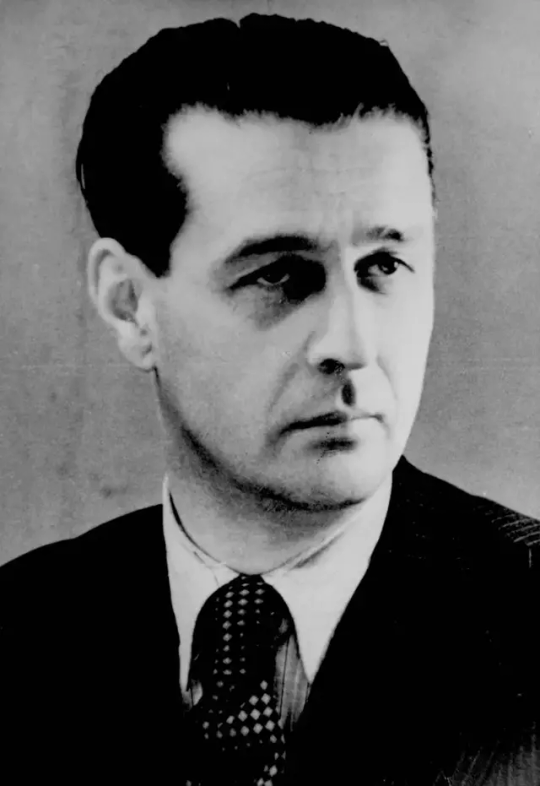
Giorgio Perlasca during the war.
Giorgio immediately teamed up with Sanz Briz to save Jews from the Nazi death machine, which was systematically massacring the Jews of Hungary at shocking speed. He later said, “I couldn’t stand the sight of people being branded like animals… I couldn’t stand seeing children being killed. I did what I had to do.” Giorgio convinced diplomats from neutral countries to shelter Jews in their embassies and homes. He created “protection cards” that identified Jews as being under diplomatic guardianship and therefore impossible to arrest. In November 1944, Sanz Briz was transferred from Hungary to Switzerland, and he urged Giorgio to go with him. However, instead of traveling to a safe country, Giorgio put his own life at risk by staying in Hungary so he could continue saving Jews from the Nazis.
The Hungarian authorities got wind of what Giorgio was doing, and they used Sanz Briz’ departure from the country as an excuse to order the Spanish embassy building and residences to be emptied and shuttered. In response, Giorgio made a bold move. He announced that Sanz Briz would be returning shortly, and he’d been appointed consul-general in the meantime. This bought him enough time to continue saving Jews, providing them with sanctuary and vital supplies. He also issued fake transit visas based on a 1924 law giving Jews of Sephardic heritage Spanish citizenship. The law had expired in 1930 but Giorgio managed to keep that part secret.
In December 1944, Giorgio stood up to high-ranking Nazi officer Adolf Eichmann – architect of the genocidal “Final Solution” – who was about to force two Jewish children onto a freight train headed to a death camp. Swedish rescuer Raoul Wallenberg later described watching Giorgio boldly defy the vicious Eichmann and rescue the Jewish boys.
Around this time the Nazi-aligned Hungarian government known as the Arrow Cross set up a squalid ghetto in Budapest for the city’s 60,000 Jews. As “acting Spanish consul-general” was privy to top-secret information, and he learned that the Arrow Cross was going to liquidate the ghetto – which meant murdering the men, women and children who lived there. Giorgio demanded – and got – a private hearing with the Hungarian interior minister Gabor Vajna. He threatened the high-ranking government official with severe repercussions against the “3,000 Hungarians” currently living in Spain. Unless the government backed down on destroying the ghetto, those Hungarian expats would be harshly punished financially, legally and professionally. The fact was, there were nowhere near 3000 Hungarians in Spain and the real number was a fraction of that. That bold threat, combined with a promise to help Vajna and his family escape the advancing Soviet army, prevented the Budapest ghetto from being liquidated, saving thousands of lives.
After the war, Giorgio Perlasca returned to Italy where he lived a quiet life as a businessman, married and raised a family. and didn’t tell a single soul about his heroic actions during the war. Meanwhile, a group of Hungarian Jews saved by Giorgio searched for him for decades. They knew their rescuer as a Spaniard named Jorge and it took 42 years for them to finally locate him. In 1987 Giorgio’s wife, children and community were utterly shocked to learn that this unassuming man had saved the lives of a documented 5,218 Jews and probably many more. The famous rescuer Oskar Schindler saved a quarter as many people as Giorgio Perlasca did.
Once Giorgio’s heroism was known, he became famous in Italy and a source of national pride. Giorgio Perlasca was the subject of a bestselling biography, “The Banality of Goodness,” which was made into a popular movie. He received many honors, including Righteous Among the Nations by Israeli Holocaust Memorial Yad Vashem, the Wallenberg Medal, the Hungarian Star of Merit, the Spanish Knight Grand Cross, the Italian Gold Medal for Civil Bravery, and many others. Noted Israeli composer Moshe Zorman wrote an orchestral piece, “His Finest Hour,” about Giorgio. There is a statue of Giorgio Perlasca in Budapest and a high school named for him, and he was featured on an Italian and an Israeli stamp.
Giorgio died in Padua, Italy in 1992.
For saving thousands of lives, and proving that people can change, we honor Giorgio Perlasca as this week’s Thursday Hero.
60 notes
·
View notes
Text
Jewish joy is receiving a message through Ancestry.com from a distant cousin who has managed to trace a branch of your family tree.
they have old photos from the 1800s and everything!
and before this, your knowledge of the family began and ended with the great-grandparents, in America. you could never trace them across the sea.
and here they are, in 1880s black and white, in diaspora in Lithuania, near the border with Poland. just a decade or so before they escaped to England, and then America, because the antisemitism there wasn't as dangerous as what was growing in Eastern Europe.
and their surname ties them to a Jewish diaspora town in Germany.
in the 1300s, the Holy Roman Empire murdered nearly all the Jews in that town because Christians made up conspiracy theories about the Jews spreading the bubonic plague.
but a few Jews survived. including your ancestors.
their surname also ties them to Jews living in Italy in the early Middle Ages. and through genealogy and studying Jewish forced migrations, you can trace them to Jews who were brought as captives to Italy from Jerusalem. and it turns out there is a whole genetic genealogy project on that branch of your family tree.
you see, your ancestors were among the Jews who *gave* that town in Germany its name. your ancestors named that town.
and ... and that town in Germany, it still exists. the town that your Jewish ancestors gave their surname to. in the 1940s, the Nazis murdered the Jews who remained there.
only one single Jew in that town survived the Holocaust.
after WWII, the Germans wanted to pave over the old synagogue and put in a parking lot. (you can't make this shit up!!)
but now, there is a tiny community of Jews who have moved there. there is a new Synagogue. a new mikvah. they have restored the Jewish cemetery there.
and yet for how long? how long before all the Jews in that German town are murdered again? how long before the Jewish cemetery is desecrated again? how long before the synagogue is burned down?
Jewish joy is always mixed with Jewish sadness.
when we find our people, we also find tragedy.
and yet. we have to keep looking for the joy.
because we are Jewish. because we love who we are. because being Jewish means learning to laugh through tears.
because being Jewish brings us joy.
488 notes
·
View notes
Text
Timezones in One Piece World
I am back with a physics post! Well, more meteorology/geography post!
I was inspired to create a timezone map after reading the newest chapter of Doflamingo's Marine by @moonbaby26 where a timezone difference was mentioned, which was a great detail! I remember thinking about timezones in OP world but never got around to it but I did now. So it made me wonder just what timezone is Dressrosa (my fav island 🤗) in, what timezone are the other islands in?
SO!
I pulled a grid of irl timezones, simplified it, and put it over the One Piece World Map! (You can see some parts where I was like, no keep it simple, simplify it).
HERE IT IS!

UTC is coordinated universal time, aka time in the center of the world. Anyway, here are the islands + locations and I'll put some ANs for some cus some are interesting.
Paradise:
Reverse Mountain [UTC -1]
Red Line Center [UTC -1]
Twin Cape [UTC 0] Greenwhich Mean Time,
📍Iceland
I find it PERFECT the exit from Reverse Mountain into Grand Line are the ones in the center of the One Piece World, not the Red Line Itself.
Cactus Island [UTC 0] Western European Time (WET)
📍irl ex: Reykyavik, Iceland
Little Garden [UTC +1] Central European Time (CET)
📍 Italy, Spain
Drum Island [UTC +2] Eastern European Summer Time (EEST)
Alabasta [UTC +3] irl ex:
📍
Jaya [UTC +4]
Skypiea [UTC +4]
Long Ring Rong Island [UTC +5]
Water 7 [UTC +6]
Amazon Lily [UTC +7]
Enies Lobby [UTC +6]
Florian Triangle [UTC +9] Japan Standard Time
Sabaody Archipelago [UTC +10]
Impel Down [UTC +8]
Marineford [UTC +9] Japan Standard Time (JST)
Holy Land of Mariejois [UTC +9] New Zealand Standard Time
Fishman Island [UTC +10]
New World
New Marineford [UTC -8] Baker Island Time (BIT)
Punk Hazard [UTC -8] Samoa Standard Time (SST)
Dressrosa [UTC -7] Pacific Daylight Time
📍 Los Angeles
It used to be in Hawaii, it fit so much, whyyyy 😭😭
Totto Land [UTC -5] Eastern Standard Time
📍irl ex: Florida, U.S.
Wano Country [UTC -4]
📍irl ex:
Uf, I think that's all the big locations. I recommend using just the UTC and then you go minus or plus just so you don't have to go converting everything. The One Piece world most likely just says "Universal Time + (number)" or sth.
So, for example, if it's 17:00 (5 pm) in Marineford (UTC +9) on a Monday, it will then be 1 am on Monday in Dressrosa.
17 - 9 (to get UTC 0) = 8 am Monday (UTC 0)
Then another -7 hours, you get Monday 1 am (UTC -7) in Dressrosa. So Dressrosa is 16 HOURS behind Original Marineford.
Interesting how Doflamingo settled in Dressrosa, which is the entire 22 hours behind Holy Land by time, symbolising how his family abandoned the privileges of Celestial Dragons. Nice.
Also, for the Blues, regarding seasons:
North Blue & East Blue = North Hemisphere such as Europe & U.S. (winter months - December, January, February)
West Blue & South Blue - South Hemisphere (like Australia & New Zealand) so the winter months are June, July, August.
The seasons are interchangable in the Grand Line depending on the islands!
Taglist: @fanaticsnail
#one piece#one piece fandom#one piece meta#physics of one piece#put in the tags which island you live on#i'm in little garden 😭😭
87 notes
·
View notes
Note
heard you have headcanons on ody and dio meeting again after he returns. how does that go? how does penelope feel?
Ooooo!!! Boy, do I have ideas [insert shakey turtle of excitement here]
So, it's a little bit complicated, and I don't want to give too much away since it relates to what I'm currently working on, BUT!
I GOT YOU, FAM!
Basically: after Diomedes gets kicked out of Argos (it's very sad, the poor man), he realizes he has nowhere else to go except literally anywhere but the Eastern Mediterranean. So, he sets off for Hesperia (aka modern Italy) to start a new life there. But in this time of heartbreak, he's missing Odysseus even more (they had a sad goodbye on Crete; it's a long story), and he decides to stop at Ithaca on the way to get some supplies and maybe visit Ody. But when he gets there, he finds that Ody is MIA and Penelope is running things. So he hangs out for a while and gets to know Pen and Telemachus (who is about 11 or 12 by this point), and quickly figures out why Ody would talk about her literally any chance he got. She's beautiful, yes, but she's also just as cunning and wise as Odysseus is... The same qualities Dio fell in love with. And Pen is curious about Dio, too. She's heard many stories and news about her husband's schemes with Dio, and she starts falling for him a bit, too. But Diomedes doesn't want to dishonor the Bro Code by getting with Penelope. Ody loves Penelope! Dio could never hurt Ody like that. So... He leaves. He says goodbye to Pen and Telemachus and heads off to Hesperia. He and Penelope wonder what could have been since they believe they will never see each other again.
BUT THEN ODY RETURNS TO ITHACA!!! YIPPEE!!! Diomedes hears this news, but he has his new city to run, so he doesn't return immediately. After a few years, though, he gets usurped and kicked out again, so he's like, "Welp. I have nowhere else to go," and he goes back to Ithaca. He and Ody reunite and there's hugs all around and it's really sweet. Dio soon finds that OdyPen had another kid, a daughter (I haven't figured out a name for her yet, but she's two when Dio shows up). This part of the story is very loose, but I do know they all put two and two together about all their feelings eventually (Odysseus is very happy about this as you can imagine lmao!) It's little slice of life stuff from there. A little hc I have about the three of them is that Dio teaches OdyPen's daughter how to box because she's a little firecracker and needs to get rid of excess energy somehow, but she can't stay still long enough to weave (plus she's really little and doesn't have the fine motor skills for that yet). Dio and Ody also work together to hone Telemachus's and Diodotus's skills (who Diodotus is... you'll know soon enough lmao). I also hc that Pen frequently tricks OdyDio into wrestling each other so she can watch for her own entertainment. She's just sitting to the side, eating her bowl of table grapes, enjoying the show okasdfhsdugif- I also hc that... Once OdyPen passes on, Diomedes leaves again. The kids don't want him to go, but he can't stay. He wants to honor Ody's wish for Tele to be king. If he stays, people will think he wants to take over. He doesn't want a war among Ody's people so... he leaves. He establishes one last city in Hesperia and feels his life coming to a close. He climbs a nearby cliff by the sea to enjoy the view, looking east. Then Athena shows up, and he accepts immortality. Sorry... Got sort of sad toward the end there, but that's a few things! I have a lot of thoughts, but I'm very scattered rn. If you have more specific questions, feel free to ask! I don't bite, I promise! :D
#char ramblings#char asks#anon ask#tagamemnon#greek mythology#diomedes#penelope#odysseus#odypendio#IN THAT ORDER#PEN GETS DOUBLE SMOOCHES#she deserves it 🥰#char writes#long post#odyssey fanfic#tkati#these are just my silly ideas#i have a lot of those lol
113 notes
·
View notes
Text
ASF!



That's not a short key smash, but my newest model railroad locomotive. Well, sort of.
ASF stands for "Akkuschleppfahrzeug", "Battery tractor vehicle". More than 500 of these little guys were built in the GDR as shunting tools between 1966 and 1990, both for the railroads there and industry, plus quite a few got sold to other eastern bloc countries (in particular Poland) as well. Nowadays they've spread around more, with some even appearing in Italy and Sweden.
The ASF is designed to push and pull single rail cars or sometimes entire locomotives within workshops and industrial sites, a job that it has been doing well for decades now. The diminutive size (about 3 meters long, wide and tall) means it'll fit anywhere, and in places where daily journeys are often measured in hundreds of meters at most, its 6 kilometres per hour top speed (4 mph) is not really an issue.
Technically, it's not a locomotive but a "device", which means it's subject to far less strict requirements for maintenance and for operator training. With all of that, it should be no surprise that it will never be seen on the mainline; even shunting in stations is an extreme rarity. The job is more to pull something into or out of a workshop. Modern devices for that are typically all remote controlled, but plenty of places also just use an old ASF.
And now it's also available in N scale. And it's just incomprehensibly tiny.
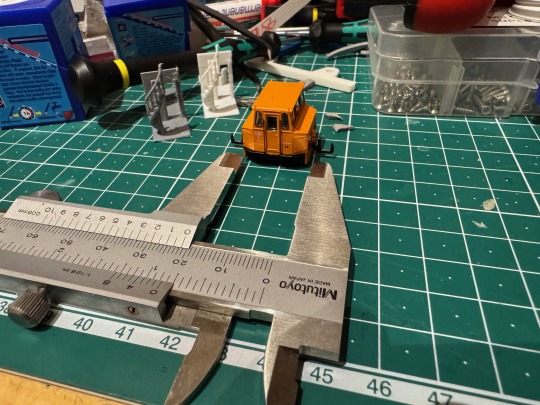
This is produced by Arnold, a brand name of Hornby's, and it actually came with DCC preinstalled. It's adorable and I love it.
But how does it run? Actually way better than you'd think.
The loop of track is a "JokeTrack", hand-made from Japan, that I want to use for something eventually one of these days. As you can see, minimum radius is not really a concern for this locomotive.
Two axles really close together and almost no weight means that electricity pickup isn't great; it'll basically only run on freshly cleaned tracks. But it's way better than it has any right to be, since the decoder comes with two relatively beefy buffer capacitors that are stored in the top of the cab. Still, it's really great at finding whatever particles you have on your tracks and stopping for them.
The top with factory decoder settings is really, really low. Probably exactly the 6 km/h walking pace translated to 1:160 scale. I may bump that up, because realism is one thing, but it takes forever to get anywhere.
The weird hooks are the end are what Arnold has given it instead of normal N scale couplings. They look horrible against a white background, but visually disappear entirely once you're on the actual layout.

If you don't like them, purely decorative replacements that look like the original weird coupler thingies are included in the tiny box. I suppose you could install one of them on one end, and have the other end to haul a car if you want. For me that's too much planning.
Speaking of, it can haul more cars than you'd think in a straight line, but once you get to a curve, it quickly drops down to just one, if at all (also heavily dependent on the car). Sadly the tiny coreless motor in it can and will stall at times, which can damage it if you keep it going for too long, so it's better to keep an eye on it while in motion.
There is no sound, the only function is the marker light. Historically locomotives engaged in shunting were supposed to only turn on the right headlight in every direction as a marker. Nowadays mainline locomotives will turn on all three lights on both ends while shunting, but the ASF was built before that, and since all it can do is shunt, it just received the marker light. F0 turns it on in the direction travel, F1 turns on the opposite end.
Anyway, a really great fun little toy that makes me happy whenever I see it, because it just looks so goofy, and it runs way better than it has any right to.
#model railroad#asf#lew el 16#n scale#n gauge#model railway#model train#model trains#model railways#model railroads
24 notes
·
View notes
Text
some notes on specifically "middle eastern" (mashriqi + iran, caucuses, and turkey) jewish communities/history:
something to keep in mind: judaism isn't "universalist" like christianity or islam - it's easier to marry into it than to convert on your own. conversions historically happened, but not in the same way they did for european and caucasian christians/non-arab muslims.
that being said, a majority of middle eastern jews descend from jewish population who remained in palestine or immigrated/were forced (as is the case with "kurdish" jews) from palestine to other areas and mixed with locals/others who came later (which at some point stopped). pretty much everywhere in the middle east and north africa (me/na) has/had a jewish population like this.
with european jews (as in all of them), the "mixing" was almost entirely during roman times with romans/greeks, and much less later if they left modern-day greece/italy.
(none of this means jewish people are or aren't "indigenous" to palestine, because that's not what that word means.)
like with every other jewish diaspora, middle eastern jewish cultures were heavily influenced by wherever they ended up. on a surface level you can see this in things like food and music.
after the expulsion of jews from spain and portugal, sephardim moved to several places around the world; many across me/na, mostly to the latter. most of the ones who ended up in the former went to present-day egypt, palestine, lebanon, syria, and turkey. a minority ended up in iraq (such as the sassoons' ancestors). like with all formerly-ottoman territories, there was some degree of back and forth between countries and continents.
some sephardim intermarried with local communities, some didn't. some still spoke ladino, some didn't. there was sometimes a wealth gap between musta'arabim and sephardim, and/or they mostly didn't even live in the same places, like in palestine and tunisia. it really depends on the area you're looking at.
regardless, almost all the jewish populations in the area went through "sephardic blending" - a blending of local and sephardic customs - to varying degrees. it's sort of like the cultural blending that came with spanish/portugese colonization in central and south america (except without the colonization).
how they were treated also really depends where/when you're looking. some were consistently dealt a raw hand (like "kurdish" and yemenite jews) while some managed to do fairly well, all things considered (like baghdadi and georgian jews). most where somewhere in between. the big difference between me/na + some balkan and non-byzantine european treatment of jews is due to geography - attitudes in law regarding jews in those areas tended to fall into different patterns.
long story short: most european governments didn't consider anyone who wasn't "christian" a citizen (sometimes even if they'd converted, like roma; it was a cultural/ethnic thing as well), and persecuted them accordingly; justifying this using "race science" when religion became less important there after the enlightenment.
most me/na and the byzantine governments considered jews (and later, christians) citizens, but allowed them certain legal/social opportunities while limiting/banning/imposing others. the extent of both depend on where/when you're looking but it was never universally "equal".
in specifically turkey, egypt, palestine, and the caucuses, there were also ashkenazi communities, who came mainly because living as a jew in non-ottoman europe at the time sucked more than in those places. ottoman territories in the balkans were also a common destination for this sort of migration.
in the case of palestine, there were often religious motivations to go as well, as there were for some other jews who immigrated. several hasidic dynasites more or less came in their entirety, such as the lithuanian/polish/hungarian ones which precede today's neutrei karta.
ashkenazi migration didn't really happen until jewish emancipation in europe for obvious reasons. it also predates zionism - an initially secular movement based on contemporaneous european nationalist ideologies - by some centuries.
most ashkenazi jews today reside in the us, while most sephardic or "mizrahi" jews are in occupied palestine. there, the latter outnumber the former. you're more likely to find certain groups (like "kurds" and yemenites) in occupied palestine than others (like persians and algerians) - usually ones without a western power that backed them from reactionary antisemitic persecution and/or who came from poorer communities. (and no, this doesn't "justify" the occupation).
(not to say there were none who immigrated willingly/"wanted" to go, or that none/all are zionist/anti-zionist. (ben-gvir is of "kuridsh" descent, for example.) i'm not here to parse motivations.)
this, along with a history of racism/chauvinism from the largely-ashkenazi "left", are why many mizrahim vote farther "right".
(in some places, significant numbers of the jewish community stayed, like turkey, tunisia, and iran. in some others, there's evidence of double/single-digit and sometimes crypto-jewish communities.)
worldwide, the former outnumber the latter. this is thought to be because of either a medieval ashkenazi population boom due to decreased population density (not talking about the "khazar theory", which has been proven to be bullshit, btw) or a later, general european one in the 18th/19th centuries due to increased quality of life.
the term "mizrahi" ("oriental", though it doesn't have the same connotation as in english) in its current form comes from the zionist movement in the 1940s/50s to describe me/na jewish settlers/refugees.
(i personally don't find it useful outside of israeli jewish socio-politics and use it on my blog only because it's a term everyone's familiar with.)
about specifically palestinian jews:
the israeli term for palestinian jews is "old yishuv". yishuv means settlement. this is in contrast to the "new yishuv", or settlers from the initial zionist settlement period in 1881-1948. these terms are usually used in the sense of describing historical groups of people (similar to how you would describe "south yemenis" or "czechoslovaks").
palestinian jews were absorbed into the israeli jewish population and have "settler privilege" on account of their being jewish. descendants make up something like 8% of the israeli jewish population and a handful (including, bafflingly, netanyahu and smoltrich) are in the current government.
they usually got to keep their property unless it was in an "arab area". there's none living in gaza/the west bank right now unless they're settlers.
their individual views on zionism vary as much as any general population's views vary on anything.
(my "palestinian jews" series isn't intended to posit that they all think the same way i do, but to show a side of history not many people know about. any "bias" only comes from the fact that i have a "bias" too. this is a tumblr blog, not an encyclopedia.)
during the initial zionist settlement period, there were palestinian/"old yishuv" jews who were both for zionism and against it. the former have been a part of the occupation and its government for pretty much its entire history.
some immigrated abroad before 1948 and may refer to themselves as "syrian jews". ("syria" was the name given to syria/lebanon/palestine/some parts of iraq during ottoman times. many lebanese and palestinian christians emigrated at around the same time and may refer to themselves as "syrian" for this reason too.)
ones who stayed or immigrated after for whatever reason mostly refer to themselves as "israeli".
in israeli jewish society, "palestinian" usually implies muslims and christians who are considered "arab" under israeli law. you may get differing degrees of revulsion/understanding of what exactly "palestine"/"palestinians" means but the apartheid means that palestinian =/= jewish.
because of this, usage of "palestinian" as a self-descriptor varies. your likelihood of finding someone descendent from/with ancestry from the "old yishuv" calling themselves a "palestinian jew" in the same way an israeli jew with ancestry in morocco would call themselves a "moroccan jew" is low.
(i use it on here because i'm assuming everyone knows what i mean.)
samaritans aren't 'jewish', they're their own thing, though they count as jewish under israeli law.
#jewish#mizrahi#palestinian jews#info#my posts#repost with more info#sorry if this isn't the best time to post it (?) then again this is my blog and i'm not indebted to anyone so (shrugs)#i've been seeing a lot of misinfo too so
334 notes
·
View notes
Text
Everything You Need to Know About Crystals: Black Obsidian
Black Obsidian (The Regal Warrior of Stones)

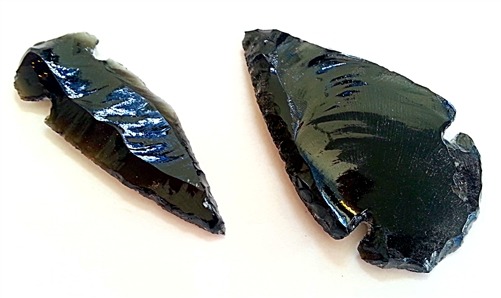


Color: Black, Dark Brown
Hardness: 5-5.5 (softer than quartz)
Rarity: Easy to Acquire
Type: Igneous Rock (Comes from a Volcano)
Chakra Association: Root
Angel: Uriel
Deities: Pele, Tezcatlipoca, Itzpapalotl and Sekhmet
Element: Fire, Earth
Astrological Signs: Sagittarius, Scorpio, Aries
Planet: Saturn, Pluto
Origin: Anywhere with Volcanic Activity
Powers: Protection, Grounding, Clarity, Releasing Blockage, Drawing out Stress, Creativity, Divination and Scrying, Negativity Banishment, Transformation and Absorption
Crystals It Works Well With: Howlite, Malachite
How is it Created: Obsidian is a black volcanic glass, formed when molten lava hits cold water or air and solidifies. It is composed of silicon dioxide (quartz) and many impurities which allows it to take different shapes and colors. Black obsidian gets it coloring from iron and magnesium.
History: The earliest obsidian tools can be dated back to the Oldowan, at the dawn of the Paleolithic/Stone Age (2.6 million- 10,000 BCE). Different origins of this rock can be found in Britain, Italy, Mexico, and the USA. In Egypt, obsidian knives were used in ceremonial circumcisions, as well as making mirrors (scrying mirrors for most) and other decorations in tombs. The word “Obsidian” was first used by a Roman explorer, Obsius, who “discovered” it in Ethiopia. In the Americas, Obsidian was used as a symbol of Tezcatlipoca, the chief god of the Aztec religion. Tezcatlipoca means “smoking mirror” which is why a lot of the Mayan priest used the glass rock for scrying mirrors like the Egyptians did. On the Eastern Islands, obsidian was used to make the eyes of the Moai statues before they were lost. The indigenous tribes of North America used pieces of obsidian to make arrowheads, spears and even knives by using an antler in order to carefully form different shapes.
What It Can Do:
Grounds the soul and spiritual forces into the physical plane, making it possible to manifest more spiritual energy
Increases one’s self control
Forces you to face your true self
Brings imbalance and shadow qualities to the surface to release them
Repels negativity and disperses self-hating thoughts
Powerful meditation aid
Great for scrying and divination as the glass allows you to look to see the “clear truth”
Can heal you after a spiritual or mental attack
Was used in the past during ritual for healing physical disorders
How to Charge:
Sit with the stone in the palm of your hand and enter a light meditation. Use your thoughts to charge the stones with desires of protection and make sure the thoughts are clear and concise.
Use high vibration to amplify the crystal
Use a singing bowl to send sound energy into it
Place it in a bed of Himalayan salt and let it sit for 48 hours
If you work with a sun or moon deity, I have noticed charging it in the sun or moonlight with the idea of protection helps to charge it as well
How to Cleanse:
Run under water (not hot just lukewarm) for a minute
Create a saltwater solution and submerge it for up to 24 hours
Burn herbs or incense over the obsidian with the intention of cleansing (I personally use sandalwood incense for this)
Leave your stone under the full moon to cleanse and retrieve in the morning
Bury your obsidian in your garden for 48 hours
How to Get the Best Out of It:
Wear a black obsidian bracelet. The wrist area is a highly energetic zone because it has nearly direct access to the bloodstream. This (in my opinion) is the best place to have obsidian to create a powerful shield and help with manifestation.
For lighter dosage, use an obsidian ring.
Crystal Grid:
Letting Go (Triangle Grid)
Mantra: “I release everything that no longer serves me”
Center Stone: Smokey Quartz Tower
Secondary Stones: Obsidian, Malachite, Rhodonite, Citrine
Best Moon Phase: Waning or Dark Moon
Best Day: Saturday
Sources
#witchcraft#witch community#witchblr#paganblr#occulltism#nature#crystals#crystal witch#obsidian#witchcraft 101#baby witch#crystal grid#rocks#witch tips#chakras#spirituality#astrology#witches of tumblr#witchcraft resources#witch blog#beginner witch#geology#gemstones
392 notes
·
View notes
Text
Announcing a new film from Wales - Smoking Shores
Non-fiction title Smoking Shores is a film about surfers in the startling industrial setting of Port Talbot, a coastal town in south Wales dominated by one of the last great steelworks in the UK.
Writer-director David Roland Warwick is himself an avid surfer who first took to the waves at the town’s Aberafan beach eight years ago. He said “It has been a huge privilege for me visiting Port Talbot over the last eight years, and being accepted by the notoriously close knit and territorial surfing community here. I am excited about the film we have been gathering together over this time, and the chance to share something of what it means to live and surf in this extraordinary place.”
The film is executive-produced by actor-activist Michael Sheen, who said “I’ve grown up knowing of the surfing community in Port Talbot and catching glimpses of them occasionally, like some herd of elusive, mythical beasts. They have a sort of cult status here. I feel very excited about the possibilities for what this film can achieve and continue to support the filmmakers' aspirations for it.”
Executive Producer Sonja Henrici (Merkel, Tracing Light, Time Trial, The Oil Machine) said “Smoking Shores is a vital film that deals with global issues which play out locally: deindustrialisation, decarbonisation and mental health - while considering our inalienable connection to nature.”
Dok Incubator Director Andrea Prenghyová said “This film captivated us at first sight - the intimate portrait of a group of surfers against the backdrop of the Port Talbot steelworks captures a striking contrast—between the pursuit of surfing dreams and the decline of a once-thriving steel industry and working-class life. It presents a layered perspective on the profound transformations that have shaped the UK in recent decades, making it a uniquely compelling narrative.”
Editor Rich Gorman said “Smoking Shores is genuinely unlike anything else I have worked on and is a constant creative challenge which excites me. The story is also vitally important, set in a compelling location and telling a local story that highlights the impact of wider global issues.”
Producer Dewi Gregory said “All Truth Department’s previous films have been set far beyond Wales’ borders; in Borneo, Scotland, San Francisco, Italy and Alabama, but all the while, we’ve been looking for a chance to tell a story of Wales that will travel far and wide. I’m thrilled that Dok Incubator has seen the global appeal of a story set in my old stomping ground.”
Lee Walters, Chief Executive of Ffilm Cymru Wales, says: “We are proud to support this insightful and timely film, and pleased to see Welsh stories represented on the international stage.”
Joedi Langley, Interim Head of Creative Wales, said: “We’re proud to work in close partnership with Ffilm Cymru Wales to support a slate of features via their film production fund. To see new titles coming out of Wales and being recognised at a global level for their huge potential is really promising, and we can’t wait to see what’s to come.”
Smoking Shores is produced by Truth Department (Donna, Orion: The Man Who Would Be King, The Borneo Case) with support from Ffilm Cymru Wales awarding National Lottery funding and by the Welsh Government via Creative Wales. The film was selected to take part in the BFI London Film Festival Works in Progress Screening, picking up interest from A-list festivals and international sales agents.
Dok Incubator selects eight films a year from global applicants for its International workshops in Eastern Europe. During the past 12 years Dok Incubator has worked with more than 170 films, many of them premiering at A-list festivals. 13 films were selected for Sundance competitions, 2 were nominated for Emmy awards, 6 for the European Film Award and more than 30 of them were screened at IDFA. Films from dok.incubator workshops are also regularly selected for CPH:DOX, HotDocs, Visions du Réel, or Krakow Film Festival. Writer-Director David Roland Warwick, Producer Dewi Gregory and Editor Rich Gorman will be attending three workshops in Slovakia and Czechia, ahead of a presentation at IDFA in November.
Producer Truth Department is seeking international co-producers, distribution, sales, festivals.
14 notes
·
View notes
Note
Ok I am genuinely and independently curious about your opinions on the fall of Rome, but I do understand it not being the time, so answer this how you best see fit to not cause fuckshit
see, the thing is that I am immune to discourse about the fall of Rome because 99% of online comparisons to ~the fall of the Roman Empire just have a very culturally osmosed idea of Edward Gibbon's decline and fall and no idea what actually happened in the late 5th/early 6th centuries, and the thing I do professionally is The End of the Western Roman Empire. that is not an exaggeration. that's what my doctoral dissertation is on. (actually, technically it's about failures of Roman identity in specific regions of the (former) Western Roman Empire, but basically the End of the Western Roman Empire.) I have spent the bulk of the past ten years thinking extensively about the End of the Western Roman Empire. It is a safe bet that I know every major argument of scholarly discourse on the End of the Western Roman Empire. I have also read the original sources in the original languages. this is just to say that like. I have a lot of opinions about the end of the Western Roman Empire, and they digress pretty significantly even from common scholarly view, let alone popular opinion. (but I can back them up! I'm not sourcing stuff here, but I can.)
the traditional end date for the end of the Western Roman Empire is 476 CE, the year the emperor Romulus Augustulus was removed from the throne by a so-called barbarian usurper named Odoacer. after that, there were no other Western Roman Emperors and Italy was ruled by barbarian kings until the foundation of the Exarchate as a result of the Eastern Roman Emperor Justinian's invasion. Odoacer was, by the way, a Roman military officer and a citizen. Romulus Augustulus was fourteen years old and had been on the throne the year previously but his father and uncle, both of whom Odoacer killed. oh, by the way, the preceding emperor? yeah, Romulus Augustulus's dad didn't actually kill him. his name was Julius Nepos, and he did get chased out of Italy. he went to his native Dalmatia (modern Croatia) and wrote angry but pleading letters to his relative by marriage, the Eastern Roman (Byzantine) Emperor Zeno, who was a little busy at the time because he had just been chased out of Constantinople by a usurper named Basiliscus. By the time Zeno succeeded in retaking Constantinople and knocking Basiliscus off, Odoacer was safely seated in Ravenna (the city of Rome had ceased to be the imperial capital some time earlier) and had 14-year-old Romulus Augustulus and the Roman Senate (still in the city of Rome) writing letters to Zeno on his behalf. Romulus and the Senate both said, essentially, hey, why don't YOU (Zeno) be the first emperor to control both halves of the empire for the first time in centuries and Odoacer can just be king in Italy, basically a governor, but it's YOUR empire.
(by the way, Romulus Augustulus was fine. he was quietly retired to a villa in Campania with his mother, we actually have letters to him from years later.)
the Italian legation seems to have arrived in Constantinople at the same time as the Julius Nepos's Dalmatian legation, which said, "hey, cousin, congrats on getting the throne back, funny story! I have the same problem. could you maybe help me out here?"
the problem is that Zeno, having just finished fighting a major civil war that almost succeeded, did not have any resources to help Nepos, and also everyone in the Eastern Roman Empire hated him (Zeno) a lot. so much. what he ends up doing is writing a strongly-worded letter to Odoacer thanking him for the offer but reminding him that he HAS a Western Roman Emperor already! right now! don't forget!
so true, bestie, Odoacer says to Zeno, and then proceeds to ignore Nepos for the next four years -- except. he continues to put Nepos on his coins. he continues to put Zeno on his coins. as far as the Roman senate and the population of Italy is concerned, they are still part of the Roman res publica. they are very clear on this fact. so are our Eastern Roman writers, interestingly, though the situation with the West is kind of tense, but Zeno is busy with like. six other civil wars. (because everyone hates him). so he can't actually do anything about the Odoacer and Nepos situation. Nepos dies in 480 (assassinated by his own nobles) and even though Odoacer springs up all "I WILL AVENGE YOUR DEATH, MY BELOVED EMPEROR" and conquers Dalmatia, this actually just makes the situation with the East worse because now there's not even the illusion of a Western Roman Emperor, but Zeno is busy having his five hundredth civil war so he can't do anything about it. (it's actually not his fault, there were numerous factors going on in the East, only some of which were that everyone hated Zeno for being essentially an outsider. his mother-in-law and his wife also hated him.)
eventually, however, Zeno manages to kill all of his problem noblemen and attempted usurpers except one guy and goes, huh, you know what. I would like you to get out of the Eastern Roman Empire but you're actually very competent so I can't beat you militarily. also would you please stop marching on Constantinople, that would be great.
that one guy is Theoderic the Great, King of the Ostrogoths. he was also a Roman citizen (Flavius Theodericus), a patrician, Zeno's son-in-arms (we're not actually sure what this entails), and a former consul, THE most prestigious office in both sides of the empire, with a host of Roman civil and military honors. he'd been raised in the court at Constantinople as a political hostage, which meant he knew the imperial system inside and out, and upon being released immediately went back to the Ostrogoths, raised an army, and started conquering things, both for and against the Eastern Romans. he had been on Zeno's side, he had been fighting Zeno, he had been on Zeno's side again, he had been fighting Zeno again, he was NOT responsible for the death of the other Gothic Theoderic, Theoderic Strabo (who once called him out for being too Roman), who died accidentally, but he was probably responsible for the death of Strabo's heir, which resulted in all of Strabo's Goths joining Theoderic's Goths. he marched on the walls of Constantinople. peak frienemy.
it's unclear if sending Theoderic and the Ostrogoths to Italy was Zeno's idea or Theoderic's, since sources differ, but one way or another Theoderic gathered up all of the Ostrogoths (men, women, and children) and set out on an overland trek to Italy, picking up various other barbarian peoples along the way, and arrived in Italy in 489, where he immediately set about making Odoacer's life a nightmare by conquering everything in Italy except Ravenna, where Odoacer holes up with his family. in 493 the bishop of Ravenna negotiates a truce between Theoderic and Odoacer, the two of them agreeing to rule Italy between them, and then Theoderic personally kills Odoacer and also has the rest of his family killed, leaving him as king of Italy -- rex Italiae.
or...what? we do know for sure that Theoderic used the title rex Italiae. he also used the titles princeps, imperator, and dominus. we even have one stone inscription, set up by a Roman senator (who ought to know) calling him augustus (emperor). what we don't know -- and scholarly ideas differ here -- is what Theoderic's actual legal relationship vis a vis the Eastern Roman Empire was because to all intents and purposes, for the next thirty years, Theoderic acted like, was treated like, and performed as the Western Roman Emperor, without ever explicitly claiming that title. but everything about his reign was centered around performing Romanness perfectly and about restoring territory to the WRE that had been lost decades earlier. which he did. he brought portions of Gaul and Spain and the Balkans under Italian rule again. he bragged about seating Gallic senators in the Roman senate for the first time in decades. every letter to he sent to the East was "okay, you're emperor, but I'm as good as you and don't you forget it, we're still the other republic (utraeque res publicae)." he went on what was essentially a triumph in Rome itself. he did the whole bread and circuses shindig. (literally, he reinstituted the annona, the grain dole, and held gladiatorial games even though he personally didn't like them.) most of the popes liked him and were happy to work with him (because they hated the patriarch in Constantinople and the various Eastern Roman Emperors). (I say most of because he definitely interfered with a couple of papal elections and may have had one pope killed.)
now, he wasn't a perfect Roman, because he was still a barbarian (non-Roman) king. there were legal distinctions between Romans and Ostrogoths in Italy. Theoderic made marriage alliances with most of his surrounding barbarian neighbors (who also all ruled former Roman territory); he wasn't a Nicene (Catholic) Christian, he was an Arian (Homoian) Christian. but he acted as a Roman emperor and seems to have been perceived as one by the bulk of the inhabitants of Italy. (yes, of course he had political enemies, yes I know about Boethius and Symmachus). also sometimes he did fight the Eastern Roman Empire but considering how many civil wars Rome had had that's basically one of the most Roman things he could do.
he dies in 525, without an adult male heir, and his grandson Athalaric becomes king under the regency of his mother, Theoderic's daughter Amalasuintha, who was essentially too Roman for most of the Ostrogothic nobility but made the Roman senate really happy. she was apparently pretty close to being a political genius, she was just unfortunately a woman. an unmarried woman. (Athalaric's father had died at some indeterminate point before Theoderic's death, we don't know when.) when Athalaric died before gaining his majority, Amalasuintha briefly reigned as sole ruler, then realized that that wasn't going to work with the Ostrogoths, and named her cousin Theodahad her co-ruler. (she did not marry him, anyone who tells you she married him is wrong. Theodahad was already married.) this backfired very badly. Theodahad had her arrested, imprisoned, and murdered.
this was a huge mistake, because Theodahad was actually incredibly incompetent, and the Eastern Roman Empire was out the lookout for blood since the Emperor Justinian was on his high horse about ~reconquering the Roman West.
and this is when the "the Roman Empire fell in 476" narrative enters the picture. it comes from an Eastern Roman Latin writer names Marcellinus comes, writing during Justinian's reign, and he is the very first person who points to that date, to the usurpation of Romulus Augustulus (who was never acknowledged by Zeno), and to Odoacer as a big, BIG change in the Roman world. previously there is no evidence that anyone in either West or East looked at 476 and thought "something fundamental has changed here." (I mean, maybe they did, but they didn't write it down or if they did it didn't survive.) in fact, Odoacer's and Theoderic's reigns were the most stable period Italy had had in decades; they'd gone through five emperors in ten years. Procopius, writing the Wars, also identifies Romulus Augustulus as the last emperor and Odoacer and Theoderic as illegitimate rulers, but the man is very much writing propaganda. (just because the Secret History hates women and also Justinian does not mean the Wars is not propaganda.) the East has a vested reason for identifying 476 and Romulus as a sea change: they want a legitimate reason to invade the West, and "avenging Amalasuintha" and "reclaiming Rome from the barbarians" are good excuses.
(Procopius really struggles with how to identify Theoderic, because he has to identify Theoderic as a usurper and a tyrant (in the technical ancient sense, not the modern one) for his propaganda to work, but even to him Theoderic is a good ruler, who could have been an emperor but never claimed the title, who held all these Roman honors, etc. there's even a big debate about Theoderic's legal status vis a vis the Eastern Roman Empire in the Wars, so it's clear that it was unclear.)
Theodahad fucks everything up, is murdered by the Goths, and the Goths name a man called Witigis as king. to legitimize this, Witigis (apparently forcibly) marries Amalasuintha's daughter (Theoderic's granddaughter) Matasuintha. too late, the Eastern Roman Empire has already invaded and they aren't stopping for shit. in 535, Ravenna falls, and the remains of the Ostrogothic court (which include a lot of Italo-Roman civil officials) are transported to Constantinople.
THAT'S the end of the Western Roman Empire, the fall of the Ostrogothic Amal dynasty.
the Gothic Wars continue for another twenty years, the Eastern Romans fuck up Italy almost irreparably (there are arguments that the repercussions were still echoing in the 20th century), and then the Lombards invade and make everything worse, but at that point there's no more Western Roman Empire, even if the Roman Senate's still around (and they are until what seems to be the early 7th century).
so basically, I feel very strongly that if anyone says they know anything about the fall of Rome, they almost certainly do not. it's not actually an equivalent situation to the modern U.S. or tbh anyone else. the 476 year is nice, it's convenient, you get the romance of Romulus Augustulus's name ("little augustus," named after the legendary founder of Rome Romulus), but it was not for more than fifty years that anyone actually decided that year was important. the situation was way, way more complicated.
#noblexcelestemorningstar#bedlam replies#your girl#I'm going to make this unrebloggable btw because my idea of hell is accidentally becoming a tumblr historian#primaries are cassiodorus's variae procopius's wars the anonymus valesianus various greek fragmentary historians ennodius's panegyrics#various papal letters boethius consolation of philosophy and some other bits and bobs
42 notes
·
View notes
Text
Religion for Sale?

I have witnessed many culture shocks since I moved from Europe to the USA, even though I’m also Canadian. I haven’t been to Canada since I was a child, and all my immediate family is Europe-based, so all the cultural changes that have happened on the American continent in the past 30 years have skipped me. The fact that I ended up going back across the Atlantic was a surprise for me in itself, as I had no plan or desire to go there for anything but a vacation. I built my life in Europe and have been focused on improving it, and for me travel is more of a side quest that involves the entire world, not just one particular country, and if anything I would have picked Japan for my number one tourism destination, not the USA.
However, life sometimes takes unexpected turns, I met my American husband and have been living there with him for over 2 years now. And among many culture shocks I have experienced so far, the biggest one is what I witnessed today, seeing that American TV broadcasts commercials for the Catholic Church to convince people to join.
If you’re American yourself, you probably don’t realize what an unthinkable thing that would be in Europe. My family is from Poland, but Poland is hardly the only country with a strong presence of catholic worshippers on the continent, and countries such as Spain or Italy also definitely hold strong in that regard. Not to mention, if you go more into Eastern Europe and witness Orthodox Christians, or Protestants in other parts of the continent, regardless of their faith, it is unthinkable for any TV station to put any religious faith as part of their commercial chain in between insurance companies and a bag of potato chips. Religion is supposed to be something that transcends the mundane, an institution and an authority in itself, a social pillar that also has connections with most governments across Europe in affairs such as marriage or education. I’m not religious myself, but what I said is an unmistakable fact of life in Europe, whether you participate or not. To display yourself on TV like that, for the Pope to be shooting commercial spots…it's a cultural revolution, and I also think it points the direction of where the world in general is going.
Statistics don’t lie. Younger generations, even in more devout societies, depart from religion more and more. Old traditions are being pushed out and replaced. There is a very strong religious minority among the young generation, that embraces traditional "faithful" beliefs in the modern world, and I have a couple of friends and ex-coworkers like that, but they are exactly as I said, nothing but a minority.
In 50 years, the times when being Catholic in so many places in Europe was the default for everyone will be over. For the institution of the Catholic church, or any religion to survive, they need to speak to the younger generation, many of which spend the bulk of their time in front of some form of screen. So what I witnessed in the USA is merely an example of where the world will be going in the next century or so, with possibly many religious or spiritual currents using advertising to make their way into the minds of young people, many of whom are confused, losing the anchor of tradition or stereotypical family sheltering, as family structures become more liberal with each generation and thus offer less security and emotional protection.
13 notes
·
View notes
Note
hi! I've been rewatching IWTV and had a q about the show - so in S1E2, lestat said he'd been there when the opera was written 73 years ago, and in S1E6, lestat said he'd played against a chess master in 1878 (?).. but in S2E7, he said he'd been sleeping for a 100 years. Which do you think is true? I think it may be the former because wouldn't he try to hide parts of his life more from the coven than from Louis & Claudia?
Hi! That's a really interesting question, anon, and not one I have an easy answer for, mostly because I think one of the (only!) places Rolin drops the ball sometimes as a showrunner is with the timelines and references to time. But! I'll try and give you an answer, haha.
There are a lot of book spoilers here, so please bear that in mind, but Lestat's definitely at least partially lying in the trial, because he's woken up by Marius and taken to the Greek Islands before he goes to New Orleans, which is a pretty important plot point that I can't see the show not adapting (Marius literally sends him away to go play house with someone aka live the mortal life he was denied by his family and Magnus, which is why Lestat's basically looking for a husband when he arrives in the US and finds Louis). It makes sense that he'd be lying about that though because Armand doesn't know that Lestat knows where Marius is, and Lestat's keeping that a secret for Reasons.
Beyond that though, what do we know about the show's pre-NOLA timeline so far? We know that Lestat was born in 1760 and turned in 1794, Nicki then died in 1796, and Lestat was then in New Orleans by 1910.
That means there's 114 years that the show's not given us much information on at all yet, and it's actually tricky to use the book as a gauge in that sense, because making Lestat that little bit older actually changes a lot.
How it goes in the book is that after Lestat gives the theatre to Nicki, and Nicki, ultimately, to Armand and the Coven, he and Gabrielle spend what's described as 'years' travelling together (sort of, Gabrielle starts disappearing on Lestat before they even leave France only to come back and find him), with Gabrielle really just wanting to travel, and Lestat trying to find Marius after being swept up in Armand's account of him, around Western Europe, Eastern Europe, West Asia and North Africa, with longer stays in Italy and Egypt. Egypt is their last stop. Lestat's receiving letters from Eleni across all of these travels (a character I'm also excited to see in the new season! She's one of the Coven vampires who does the most to look after Nicki and build the Theatres des Vampires), and she and Roget (the lawyer we've met the descendent of in the show already) are who keep Lestat up-to-date on the French Revolution and his family. Both are telling Lestat not to return to Paris because of said Revolution, and it's at the last stop in Cairo when Roget writes Lestat to tell him that his brothers and their families have been executed, but that his father's escaped to New Orleans, and when Eleni tells him that Nicki's died.
It's then that Lestat and Gabrielle part ways (Gabrielle wants him to go deeper down into Africa with her, but Lestat's understandably extremely griefstruck and can't manage it), and Lestat decides that he's going to go to New Orleans instead to care for his dying, exiled father. That never ends up happening. Gabrielle leaves, Lestat gets burnt, and ends up buried beneath a torched building for the long sleep until Marius - having found the messages Lestat's left him - comes to pick him up.
SO, with Lestat's year of birth being the same in both the book and the show - 1760 - but being turned at 21 in the book instead of 34 in the show - so in 1781 instead of 1794 - and the French Revolution running from 1789-1799, Lestat and Gabrielle were presumably traveling with one another in the book for about a decade?
It can't be a direct adaptation of that anymore, given we're in the thick of the French Revolution on the show when Lestat's turned, meaning his family (and him!) are already targets, so it actually does make sense to me that they'd condense that timeline. Having Nicki's death be in 1796 kind of verifies that for me too, because I think it implies that the show is going to keep Nicki's (assisted) suicide + Lestat's brothers' murders together symbolically, and it makes sense. The French Revolution was pretty localised to Paris in the early days (although the Reign of Terror with most of the massacres was between 1793-1794, and I'm curious to see if the show ties that into Lestat's escape from the Auvergne and/or his turning), and the death of Nicki and Lestat's family, and the escape of both his parents, really marks the end of Lestat's mortal ties in the same way that Grace burying Louis does for him.
But yes! More to your point, the show's either going to be condensing Gabrielle and Lestat's travels to two years instead of ten, they're going to have Lestat find out about their deaths long after the fact, or they're going to be having Gabrielle and Lestat travel after those deaths, which - - I don't know if the last one works? I think it's a pretty massive trigger point for Lestat, of course - it's enough for him to burn himself, then starve himself - but also the beat of him wanting to go and care for his abusive, dying father feels like such a revealing and meaningful moment for his character.
To your question though, anon, (sorry, haha, this has devolved so much). I've always read the line about playing a chess master in 1878 to be a lie. I think he was just being a dick to Claudia, especially because he does it after Claudia's being so goading to both him and Louis about Nicki and the song Lestat wrote for him (and the one for Louis). I feel like it's a way for him to get control of the conversation, especially given there's no way Claudia can prove him wrong, and I don't think either of them even know Lestat had a long sleep yet at all.
As for the question in 1.02, assuming it's still roughly 1911, that's probably meant to be true, given that would be 1838, so I don't think Lestat's lying, but I suspect it'll be a plot hole going forwards. I could be wrong, but I get the impression that Rolin and Co hadn't really plotted out the broader timeline outside of New Orleans in s1 beyond events that were important to the season i.e. Lestat's turning, and so it's kind of a secret third thing (a mistake), as opposed to a lie or a truth, haha.
I do think he's lying in the trial though too. Like I said, he's definitely lying about Marius, and he's also lying about burying himself in Paris if nothing else, given him burying himself in Cairo is pretty important narratively.
#i only finished my re-read of tvl semi-recently and i'd forgotten how much i adored eleni#she's such a lovely supporting character#the fact that they don't have her with the theatre still in s2.....#if any of the paris coven did a thing to her...............rolin............................................#i hope he had her leave so that she wasn't involved in the trial + louis didn't kill her#SHE should be on a greek island with a fancy drink and a hot lover#she deserves it#iwtv s3 speculation#iwtv timeline#tvl spoilers#iwtv asks
10 notes
·
View notes
Note
I think a lot of people dont realize book armand was enslaved because they arent aware white western europeans did enslave and forcefully stripped white eastern europeans out of their culture in the past a lot. I specifically see marius' behaviour and prejudice towards amadeos eastern background not talked about much. Still, this doesnt justify not realizing amadeo was legally bought and owned as a sex life. And this still happens today. People are trafficked. Imo his enslavement will be put front and center in the show. With Armand being south asian there is no way marius&armand will be treated as a father&son dynamic. Armand can see him as a father but first and foremost its going to be presented and seen as a slave owner& his slave
I agree that this is probably part of it.
I think when many people hear the word “slave” they think of something more akin to the transatlantic slave trade, not Roman pederasty, which is the model for Marius and Amadeo’s relationship and sort of what I was alluding to in my original post. Marius doesn’t treat Amadeo the way we might think of slaveowners treating their slaves in a more modern context — aside from whipping him as a punishment — but Amadeo’s status as a slave and a foreigner (specifically from a region Marius deems “savage” in comparison to Italy) is what emboldens Marius to sexually exploit and groom him, because Marius comes from a society in which an adult man could legally have sexual relations with a younger boy only if the boy was a prostitute or slave — and often a non-Roman, but not necessarily non-European, one. (Disclaimer: I am not an expert on pederasty in Ancient Rome, so if anyone more knowledgeable would like to correct or add to anything I’ve said here, please do.) Considering Marius derives most of his personal philosophy from Ancient Roman ideals in a somewhat legalistic manner, I simply do not think he would have sex with Amadeo were Amadeo not a slave — though I am open to other takes on that.
In my — potentially unpopular — opinion, the abusive/incestuous parent/child dynamic is not the most useful analytical framework to apply to Marius and Amadeo’s relationship, because while Marius views Amadeo as a son, and Amadeo views Marius as a father figure, these roles ultimately are pretense (Amadeo is still a slave from a legal standpoint, and even centuries later, as Armand, he continues to refer to Marius as his master) and treating them as legitimate obfuscates the nature of the structures that enable abuse in their relationship. This is not to say that the nuclear family as a social model does not enable abuse, of course — just that it’s not the only social model that enables abuse, and trying to map familial roles onto other types of abusive relationships can be misrepresentative. The maker/fledgling bond does lend itself to a familial reading more than Marius and Amadeo’s vampire/human relationship does, but it gets a bit more complicated than human familial relationships, so that’s a topic for another day, perhaps.
I completely agree re: the show emphasizing Armand’s enslavement — especially if they end up adapting any of TVA, since no one in Renaissance Venice is going to look at a South Asian boy and assume he’s a rich Italian man’s son. I also think it’s going to make Marius’s racism a lot more obvious and uncomfortable, which is great, because it is uncomfortable! Even if you ship them, it’s hard to overlook that Marius denigrates Armand’s cultural upbringing. But like you said, many people don’t talk about it much in the context of the books because they’re not as aware of bigotry against Eastern Europeans as they might be of other forms of bigotry. And while Armand’s backstory doesn’t directly mirror the way sex slavery operates today, you are totally correct that it still happens — and it is often still Eastern Europeans who are trafficked in Western Europe.
#as a lithuanian american I have thoughts on how anne rice handles armand’s eastern european background#but that is also a topic for another day since this reply is already much longer than it needs to be lol#thanks for the ask anon! I’ve been ruminating on this one for a while#answers#iwtv#the vampire chronicles
9 notes
·
View notes
Text
I don't want to bother too much the userbase, but, I have something to ask my fellow northern, central and eastern europeans (basically everyone from a country were Disney is published by an Egmont subsidiary... plus Greece).
What's the deal with Mickey Mystery (Mickey Mysterier/Ein Fall für Micky/Dekkari-Mikki/Mikke krim/Musses mysterier/Μίκυ Μυστήριο)? What was this projects about? A handful of stories were published here in Italy too, on Topomistery, but the title mostly published italian (or Gottfredson) reprints. I can see that a lot of stories were produced, outlasting every eponimous title. Were the stories good?
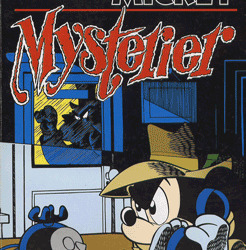
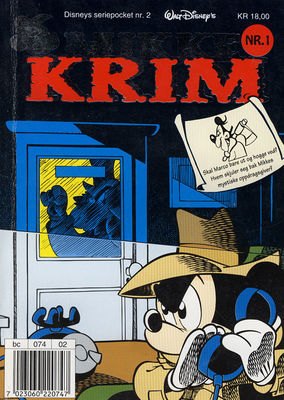
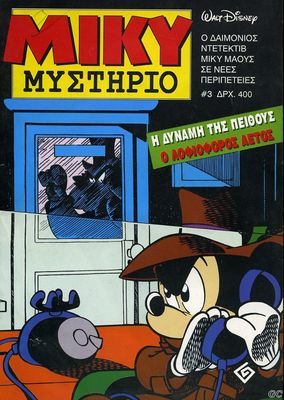


56 notes
·
View notes
Text
Twisted Wonderland Arknights!AU HCs Part 1: Savanaclaw
Commemorating my return to this blog after 1212391813 years (rl has been overwhelming), I'd like to write myself a self-indulgent HC of a crossover between two of my current gacha game hyperfixations.
Some weeks ago, thanks to my insomnia, I made a thread on twitter to make myself sleepy. It's about TWST characters with visible physical characteristics that may pass as Arknights characters which includes their possible race as well but I can only post pictures without explanations. So now, I'd like to do the similar thing but I'm gonna break down the ideas.
Explanations including the description and lore of the races, a quick highlight of what I thought as interesting parallels in settings, stories, or characters, and simple wild guess about what specific animal species they could be since Arknights is pretty specific with the animal species' they referenced in this game.
Disclaimer:
English is not my first language and this post is so self-indulgent I don't even think much about the grammar or such so bear with me and my messy writings.
Pardon any lore inaccuracies of both games. Feel free to correct me if you find any.
Introduction to non-Arknights players and those who are not familiar with the game: Arknights is an RPG tower defense mobile gacha game made by Chinese developer 'Hypergryph'. The story of Arknights took place in a dystopian, post-apocalyptic planet called Terra. The 'humans' who inhabited Terra got kemomimi and anthropomorphic features of animals and mythological creatures, which then divides them into several races based on the animal they're referenced from.
Leona Kingscholar | Race: Aslan
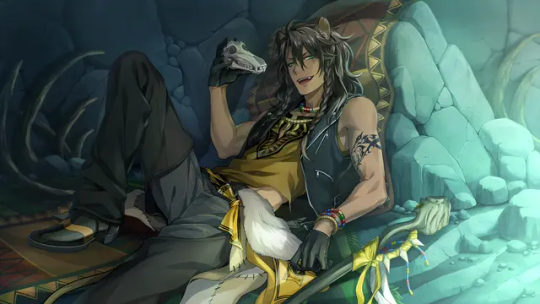
Aslan is a race in Arknights which is based on lions, they're somewhat a sub-race of the Felines which is based on cats and big cats. They originated from desert area of a country called Sargon, though many of them migrated to a country called Victoria, the Arknights equivalent of the United Kingdom. This race is known to bring the blood of royalty and prominent figures in politics.

The only aslan character in-game so far is Siege, the leader of a street gang called the Glasgow Gang and the last heir of Victorian royalty. Personally I like how Siege's rough vibe as a gang leader as well as her royalty background kinda matches well with Leona. Even I've seen some fan-artists draw crossover fanarts of them and boy do I need more of them.

Since Leona was twisted from the Lion King, I believe that his referenced species is Panthera leo melanochaita, a sub-species of African lion mainly inhabiting Southern and Eastern Africa where many assumed was the setting where the Lion King take place.
Ruggie Bucchi | Race: Reproba/Rebbah

Reprobas in Arknights are based on hyenas and the can be recognized through traits such as pricked ears and tails with tufts of hair, spots, or stripes. Just like the aslans, they originated from desert area of Sargon as well though many of them ended up spreading everywhere across Terra. They're known to possess knowledge in wilderness survival which is also why many of them are working as mercenaries, biologist, geology researchers, and such.

Since he's twisted from the hyenas of the Lion King, undoubtedly his referenced species would be the spotted hyena (Crocuta crocuta).

Jack Howl | Race: Lupo
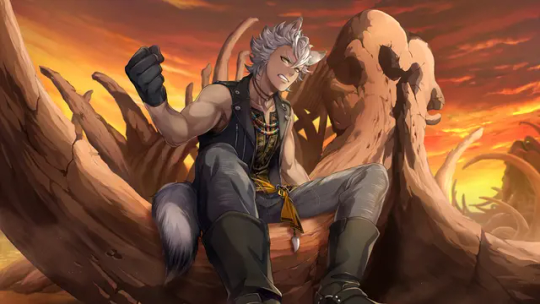
Lupo is a race based on wolves. Their traits can be noticed by their pricked ears and bushy tails. They originated and mostly found in a country called Siracusa which is Arknights' equivalent of Italy. Siracusan lupos are often associated with mafia-like community, though many of them are also working in other fields.

Now, there are no wolf character in the Lion King and from Jack's unique magic we can see that his wolf form definitely doesn't seem like any African wolves (not to mention that unlike Ruggie and Leona who came from Sunset Savannah, Jack came from Shaftsland). His fur is white and seems thick, indicating that he's most likely a part of wolf species that lives in colder climate. With that in mind, I think the best referenced species for Jack is the Eurasian wolf or common wolf (Canis lupus lupus).

· ✦ ·* . • · •. ✶˚ . ·✧ ˚ · . ·* . ✵. ✵ .· ✵ ✫˚ · · . ·✦ ˚ · . ⊹ · . * .. . °
And that's all for Savanaclaw. I made this as a stress-reliever but if there are anybody who read this post I really appreciate you for your time and I hope this could entertain you🥰 .
Nobody's asking but, yes, I'm gonna continue making the 2nd part of this. Hint:

Images & information sources:
https://arknights.fandom.com
https://arknights.wiki.gg/
https://twisted-wonderland.fandom.com/
https://www.wikipedia.org/
#twisted wonderland#twst#twst au#arknights#savanaclaw#jack howl#ruggie bucchi#leona kingscholar#twst headcanons#idk why I put so much on researching for this more than I did with my undergrad thesis
12 notes
·
View notes